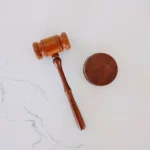Statistics may show that guys are more likely to be at fault in crashes, but the driver’s insurance company is going to be the one you deal with, not the driver themselves. You can get more money if you know how to negotiate, how to get in touch with the company, and what paperwork you need.
So, if you’ve ever wondered how to deal with an at-fault driver’s insurance company, keep reading to gain the knowledge you need to secure adequate reimbursement.
Gather Necessary Documentation
First, take thorough pictures of the accident scene. These pictures should show the damage to all the cars involved, any problems with the road that might have caused the accident, and any injuries.
Also, if there is one, get a copy of the police record. This paper states what the police officers saw and any tickets they gave out. It also shows who is at fault and backs up your claim.
Medical papers and bills for any injuries you sustained are crucial pieces of evidence too.
Don’t forget to include any insurance cards that were exchanged at the scene of the accident. These cards contain the policy number and contact information.
Know Your Rights
You should learn about the at-fault driver’s policy, particularly the limits of their coverage.
Liability limits refer to the greatest amount the insurance company must pay. Based on the policy and state laws, these boundaries may be different.
In addition to liability coverage, the policy may include other types of coverage, such as personal injury protection or uninsured motorist coverage. Learning more about these coverages can help you figure out if you have any other ways to get paid.
Contacting the Car Insurance Company
Start by making it clear why you’re calling and give a summary of what happened. Focus on the facts and avoid going into too many details in your talk.
Usually, the insurance agent will ask you about the accident and your claim during the first talk. In later follow-ups, you may be asked for additional proof, such as medical records, repair quotes, or proof that you’ve lost income. The insurance company might also review the car themselves.
Recognizing Signs of Bad Faith
Insurance companies must handle claims in good faith. This means processing claims efficiently and providing a fair settlement offer.
If you suspect bad faith, it’s crucial to take action at once. Talking to a car accident lawyer is the first thing you should do.
Delayed Claims
Lack of proof or unwillingness to cooperate are two of the most common reasons why claims are delayed. That being said, if you file a complete claim with the other driver’s car insurance and don’t hear back for weeks or months, that could be seen as bad faith.
Low Deals
It could be a sign of a bad claims practice if the payout offer is much less than the losses or harms that were done. Before turning down an insurance company’s offer, talk about your case with a lawyer. They’ll review similar cases to confirm if the offer is fair.
Refusal to Communicate
If they don’t answer your calls or emails, it could mean they don’t want to deal with the claim honestly. Make sure you keep records of all emails, letters, and notes from phone calls you have with the insurance company. You can use these documents to prove you’re being ignored.
Knowing When to Seek Legal Advice
Besides suspicions of bad faith, seek legal representation if you have suffered severe injuries or face long-term consequences. A personal injury lawyer can help make sure you get the money you need for hospital bills and ongoing care.
A lawyer is also necessary when there are multiple parties involved in a car accident, questions about who is at fault, or complicated legal problems.
Spotting Weaknesses and Strengthening Your Case
Be objective and figure out what might go wrong with your case. This could include things like your part in the incident, missing proof, or witness comments that don’t match up. When you know about these weaknesses, you can take steps to fix them.
If you see weak spots in your case, get more evidence from experts to improve your claim.
Let’s say you want to establish a clear link between your injuries and the accident. This could mean getting camera footage, accident reconstruction reports, or talking to medical professionals.
Being honest and consistent are important parts of building your case. Make sure all your conversations, comments, and paperwork are uniform. Any mistakes or contradictions can hurt your trustworthiness.
Finalizing the Settlement
As soon as you and the insurance company agree on a payout amount, the insurance company will give you papers to sign that free them from any future responsibility. Once you sign the papers, they will process your cash. There are different ways for the insurance company to pay, such as a lump sum, a planned settlement, or a mix of the two.
Carefully read the papers before signing them to make sure they reflect the deal that was made. The names, addresses, and settlement amounts regarding all relevant parties must be accurate. When there are mistakes, the finalization process may take longer than planned.
Remember that it can take months or even years to receive your money.
These long wait times can hurt your funds, especially if you can’t work because of your injuries. If bills start to pile up, show proof of your compensation amount to your creditors, like your mortgage lender or utility company. Once you can show that you’ll pay eventually, ask them to change your payment plans or give you short-term help.
How to Deal With an At-Fault Driver’s Insurance Company
So, how to deal with an at-fault driver’s insurance company? You can simplify the process if you write down the damage you’ve suffered, watch out for bad faith, and hire a lawyer to help you negotiate.
Keep fighting for fair pay for your injuries and losses. If you need more help, check out our law articles to learn more about how to protect your rights.
Recommended Article for you- A Legal Guide On How To Dispute A Car Accident Fault
Read Also: Empowering Your Dreams: The Role Of Naturalization And Citizenship Lawyers







